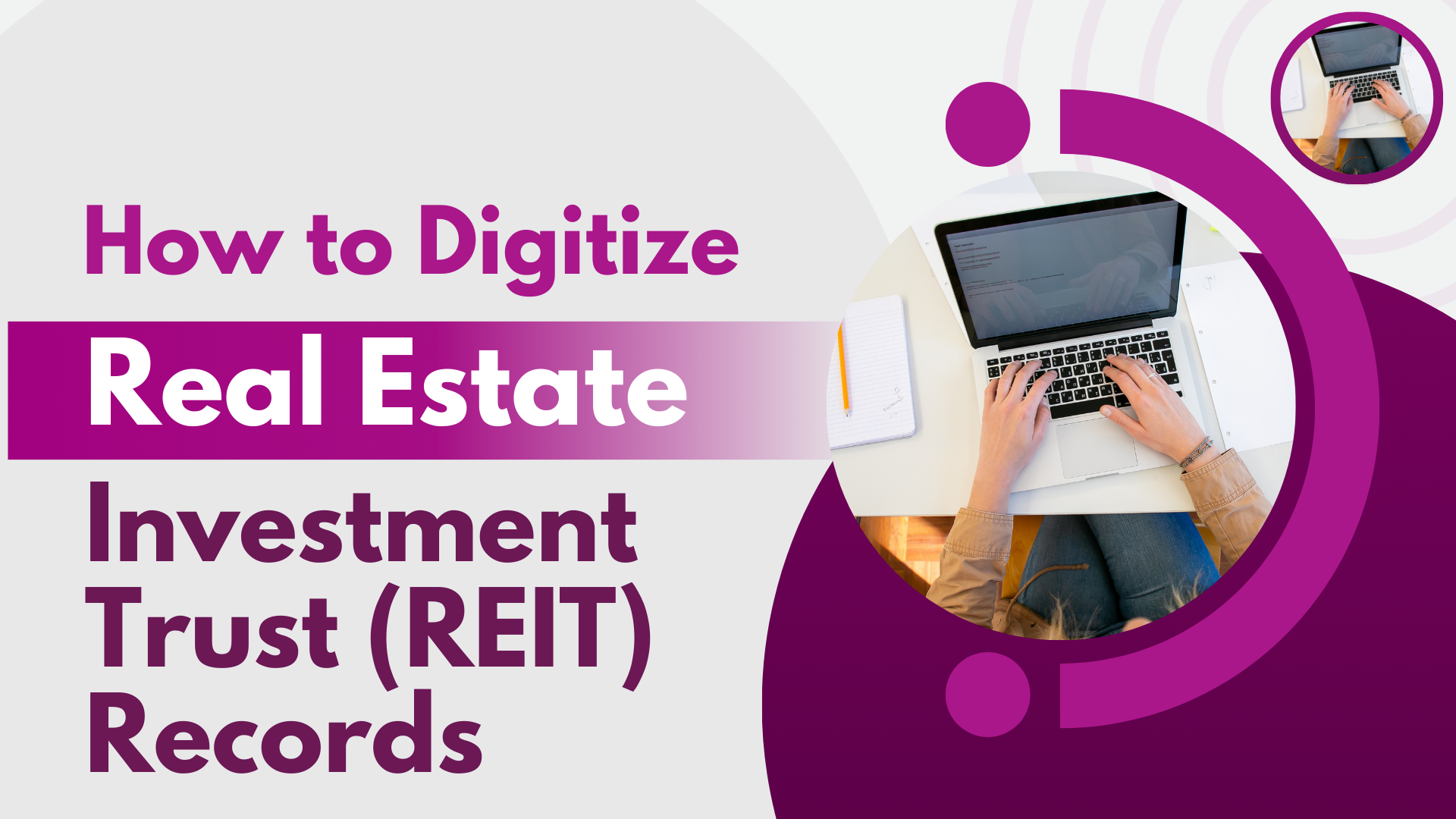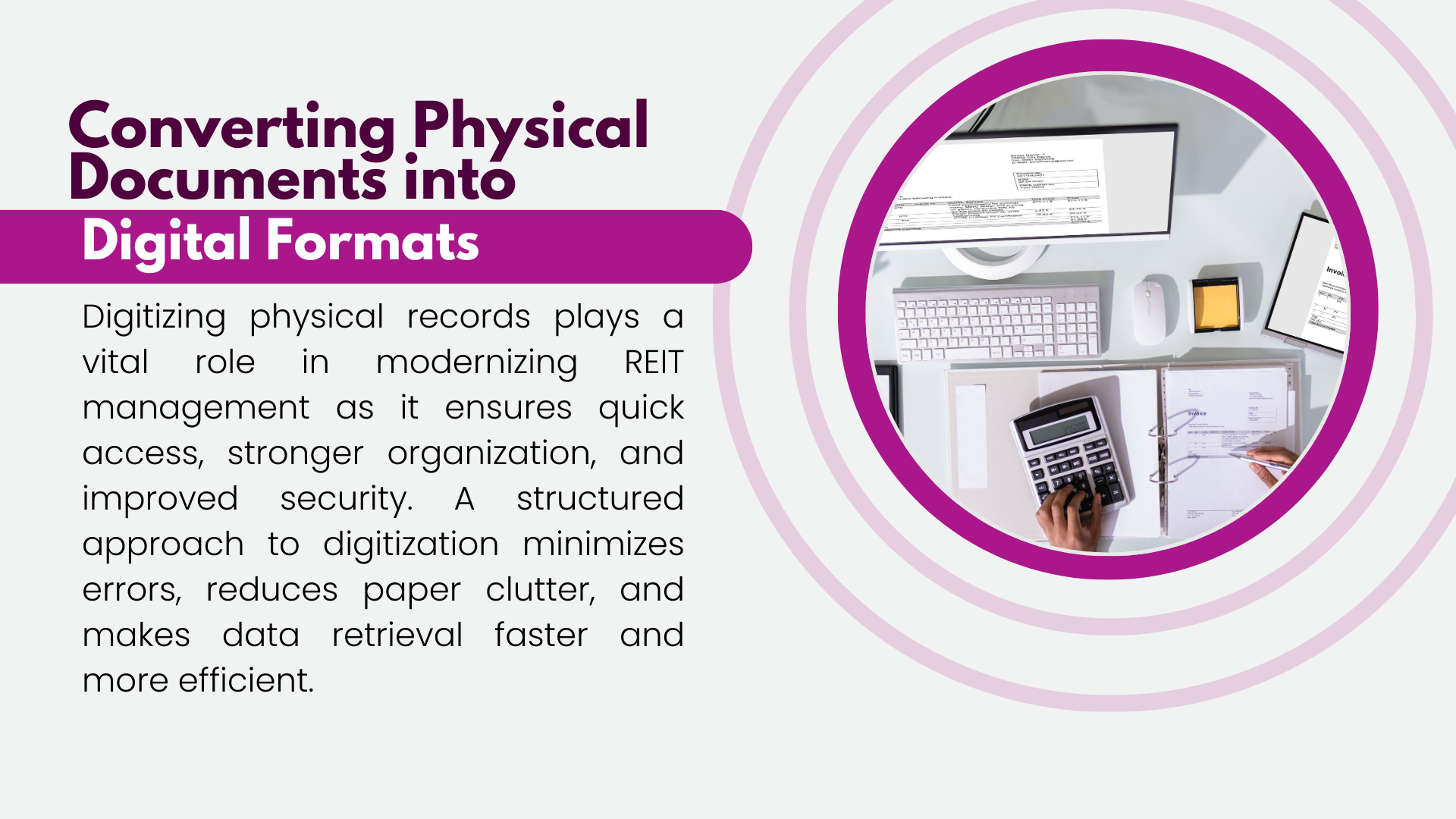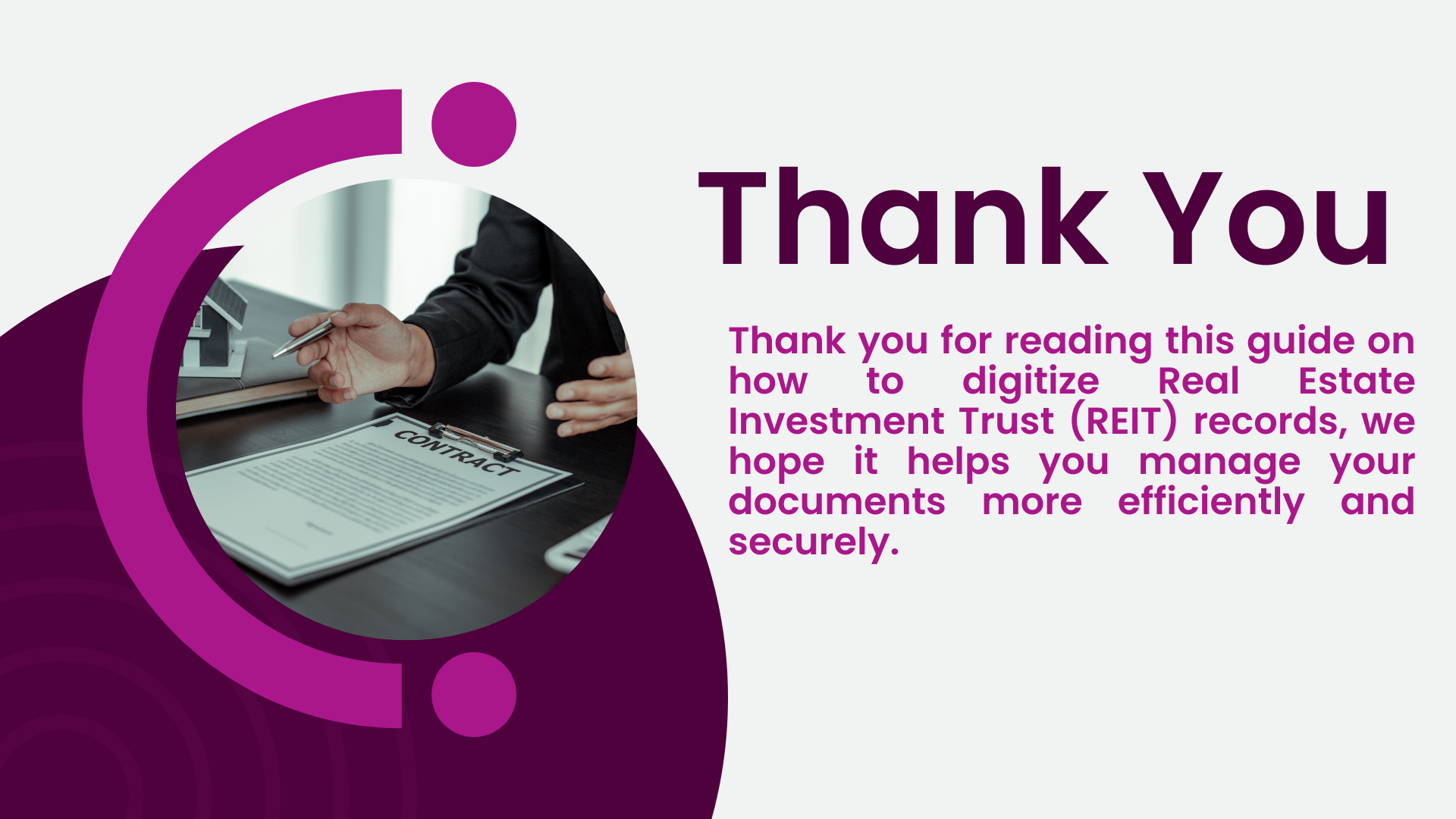إعلان مُمول
How to Digitize Real Estate Investment Trust (REIT) Records

Main Points
-
Digitize records with high-quality scanning.
-
Convert PDFs to Word for easy editing.
-
Standardize naming for quick retrieval.
-
Use version control to track changes.
-
Conduct security audits for compliance.
Real Estate Investment Trusts (REITs) hold a large number of financial, legal, and functional records and, therefore, require efficient record-keeping for compliance and decision-making.
The slow traditional method of keeping records on paper increases the risk of losing data and creates difficulty accessing important information in times of need. With the growth of REITs, there is a pressing need for a well-structured digital transformation.
Imagine handling REIT records without stress everything organized in one place no piles of paper no wasted time. With a proper digital system you get instant access to important documents whenever you need them.
Audits and reporting become simple mistakes are reduced and the extra admin work is cut down. This means professionals can spend more time focusing on smart investments instead of drowning in paperwork
Looking at it this way moving to a digital first approach can make REIT operations more transparent and build stronger investor confidence with the right tools and strategies organizations can quickly and easily transform organize and secure their records turning them into a flexible and resilient investment framework that keeps them ready for the future
Assessing Your Current Record-Keeping System
A well-structured digital migration for Real Estate Investment Trusts (REITs) begins with a rigorous evaluation of currently existing records. While the efficiency of processes may be evaluated, their failure to do so gives rise to compliance issues, security vulnerabilities, and accessibility challenges. This step guarantees a smooth transition to the digital-first realm.
The Key Steps in Identifying Records
-
Categorizing documentation as financial, legal, and operational.
-
Mapping storage locations to know if files exist in paper-based form or on local systems, or in cloud storage.
-
Analyzing file formats to ascertain whether documents can be edited, searched, or require conversion to be more accessible.
Evaluating Gaps in Accessibility, Security, and Compliance
Many REITs today have storage systems that act as slow impediments to efficiency. Such issues may include:
-
Delays affect access to records, thereby eroding timely decision-making and investor reporting.
-
Security threats arising from possible unauthorized access to information considered sensitive.
-
Compliance challenges, where improper storage leads to unfulfilled regulations.
A digital solution should permit records to be inspected by relevant staff while observing industry regulations, such as, among others, the SEC record-keeping requirements about public REITs. Such audits should ideally be conducted routinely to gauge policy conformity.
Examining Data Redundancies and Inconsistencies
Duplicates or obsolete records block storage and create inefficiencies. Harvard Business Review research shows that companies lose nearly 30% of their workweek looking for misfiled or redundant data. A document audit makes it possible to:
-
Identify and destroy old records.
-
Create standard naming conventions that prevent duplication.
-
Use metadata and indexing to enhance the searchability of documents.
Fostering a Structured Digital Transition
Defining concrete operational goals ensures that the digital transition proceeds efficiently and fulfills operational requirements. Some considerations are:
-
Digitization plan: Prioritize scanning and conversion of key records first.
-
Security protocols: Encrypt and enforce controlled access to highly sensitive data.
-
Establish automation protocols for the retrieval of documents and compliance tracking.
-
Ensure compliance with all relevant regulations through periodic review of storage policies.
Choosing the Right Digital Storage and Management Solutions
REIT record management is, in fact, a system of digital storage organization. An appropriate document management system ensures the security, scalability, and easy retrieval of records, thereby lessening administrative burden and compliance risks.
Cloud Document Management Systems vs. On-Premise Document Management Systems
Cloud Solutions: Remote access, automatic back-up, and scalability are some of the features of a cloud-based DMS that do not need extensive IT infrastructure. They are thus well-suited for REITs having multiple stakeholders who require real-time access to documents. However, the vendors of these cloud services must evaluate their security measures and data ownership policies.
On-site Solutions: Offer complete authority over storage and security over data, and are apt for organizations willing to spend much on them. Such solutions usually require a dedicated IT team to maintain and scale out the systems, thus increasing operational costs.
Key Considerations: Choosing between a cloud based document management system or an on site one depends on how sensitive the data is what compliance needs must be met and how much the system should grow over time in many cases a hybrid setup works best because it offers the flexibility of the cloud while still keeping control over the most critical elements.
Best Practices in Organizing Digital Records for Easy Retrieval
-
Folder Hierarchies: Create a logical structure, for example: property-wise, investor-wise, by financial year, or document type.
-
Automated Indexing: Use AI-based indexing to render scanned documents searchable; this saves time associated with searching for a manual retrieval method.
-
Regular Audits and Cleanups: Schedule regular review and archiving of obsolete records to keep things tidy and compliant.
Assure Smooth Integration with the operations of a REIT.
Seamless Integration with Existing Software: The document management solutions offer compatibility with different platforms, such as accounting, compliance, and property management solution suites, to facilitate de-duplication efforts.
-
User Access Controls: By using AI based indexing scanned documents can become fully searchable. This saves a huge amount of time compared to digging through files manually and makes finding the right information faster and easier.
-
Automated Workflow Management: Document approval flows for contracts, financial reports, and compliance filings are an efficient way of managing operating costs better.
Converting Physical Documents into Digital Formats

Digitizing physical records is key to modernizing REIT management by allowing easy access, better organization, and better security. A concrete approach in digitization checks potential errors, lessens paper clutter, and facilitates easy retrieval of data.
Using High-Quality Scanning Tools for Document Digitization
Buying high-resolution scanners is a must because documents need to be scanned with clarity and legibility in mind. Bad scans lead to records that can hardly be read, and retrieval becomes nearly impossible. Important parameters that may steer our selection of scanning tools include:
-
Resolution and Colour Depth: Higher resolution (300 DPI or better) gives clear text and image reproduction.
-
Batch Scan Capability: The ability to scan documents in bulk automates and saves time and labor.
-
Cloud Integration: Scanners that allow direct uploading to the cloud for secure and instant storage. File Format Support: The scanner must support several file formats, such as PDF, TIFF, JPEG, and others.
Ensuring Editable and Accessible Records with PDF to Word Conversion
Many REITs' important documents, such as lease documents and financial reports, are stored in PDF format. PDF retains the formatting, which may complicate editing. These tools to convert PDF to Microsoft Word enable REIT professionals to update, annotate, and alter documents without affecting the structure.
-
Lease Agreements: Editable Word documents are acceptable for alterations such as changing rental terms, renewal clauses, and tenant information without the need to retype the entire lease agreement.
-
Financial Reports: Conversion of financial reports into an editable format has the added advantage of assisting statistical analysis, audits, and compliance reports.
-
Contracts for Negotiation: Legal teams can facilitate changes to agreements in real-time just before the contracts are finalized.
Standardizing the Naming of Files and Their Organization for Easy Retrieval
Once documents are digitized, proper organization ensures that records are well managed. A proper naming convention reduces ambiguity and helps to fasten access.
-
Being Consistent in File Naming: To facilitate easy searches, a standardized format is to be used, like Lease_TenantName_2025.pdf.
-
Folder Hierarchies: Organizing files into types, years, or property locations will help logically store them.
-
Metadata Tagging: Adding relevant metadata (like contract date, property ID, etc.) will enhance searchability.
Implementing a Secure and Compliant Digital Workflow
It is well-established that a well-organized digital workflow is crucial to keeping REIT records secure, compliant, and accessible. Encryption, access controls, automated retention policies, and version control will ensure the protection of sensitive data from standards of compliance while enabling organizations to safeguard sensitive data.
Sensitive REIT data should be secured through access and encryption.
REIT records have private financial transactions, investor information, and legal documents. Thus, data research is very important. Implement strong encryption techniques to protect documents at rest and in transit.
-
End-to-end encryption protects the information from unwanted users.
-
Role-Based Access Control (RBAC) allows an authorized person for document access documents.
-
Multi-step verification (MFA) leverages stronger identity proofing for logging into systems, lessening the chances of a breach.
-
Audit trails and activity monitoring keep an eye on access and identify deterred attempts.
Well-defined access control would minimize the risk of leakage but still allow an employee to easily retrieve records as needed.
Version Control Tracks Document Updates and Ensures Data Integrity.
It is important to keep complete and up-to-date records for financial reporting and audits. A version control system helps track changes, prevents inconsistencies, and restores previous versions of documents if needed.
-
The entire history of versions is logged automatically as a transparency mechanism after edits and updates.
-
User permissions for editing vs. viewing prohibit true editing but allow viewing.
-
Rollback functionality, in the case of human mistakes, allows restoration of earlier versions.
This guarantees that the records of REITs are verified, traceable, and meet the standard of compliance.
Regular Security Audits and Compliance Checks
Along the line of a secure digital workflow, the REITs should carry out security audit exercises and ensure compliance with each other. These audits help in identifying vulnerabilities, checking access controls, and verifying adherence to industry regulations. Thus, these segmentations can be classified as:
-
Security assessments are conducted quarterly for the evaluation of potential threats.
-
The internal compliance review concerning the country's laws.
-
Plans for preparing responses to aberrations in data.
Keeping proactive security and compliance checks helps REITs to fortify their digital infrastructure while minimizing operational risk.
Secure Backup and Disaster Recovery Planning
Despite all this, data loss usually happens when attacked by a cybercriminal, the system fails, or human errors occur. A backup and disaster recovery strategy would be the one that guarantees business continuity in unforeseen events.
-
Redundant, automatic site backup decreases manual data restoration efforts following human error.
-
Redundant off-site cloud backups ensure business continuity during disasters.
-
Crisis drills measure responses and check the resilience of the system.
Final Thoughts
The digitization of real estate investment trust records is vital for improving operational efficiency, compliance, and security for data security. A methodical approach, starting with assessing current record-keeping procedures to selecting the appropriate digital storage solutions and safe implementation of workflows, will ease document management and reduce administrative burdens - especially when using tools like I Love PDF 2 to streamline PDF handling and conversions.
Automated retention policies, encryption, and version comments will secure the data of the REITs within secrecy but not transparency or access. Adoption of digital transformation is inevitable in the real estate industry to maintain continuous efficiency in regulatory compliance and sustainability of investment for the future.



